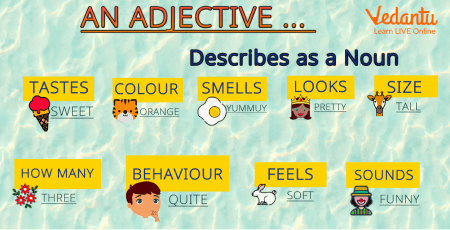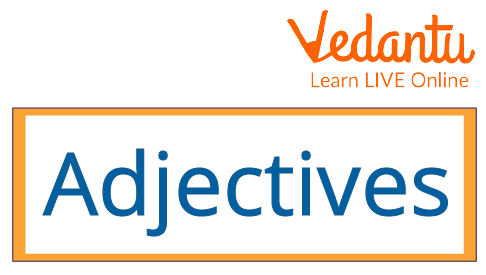Key Adjective Concepts and Practice Questions for Class 3 English Grammar
FAQs on Adjectives in English Grammar for Class 3 – Guide & Practice (2025-26)
1. Are degrees of comparison adjectives?
Yes, the three degrees of comparison are very much adjectives, just divided into classes which describe the “degree” or intensity of the adjective.
2. How do you form the degrees of comparison?
The positive comparison stays as the basic form of the adjective, whereas the comparative and the superlative have “r”, “er”, and “est”, “most” as their suffixes, respectively (hot, hotter, hottest; slim, slimmer, slimmest; bad, worse, worst).
3. What is meant by the comparison of adjectives?
When you compare adjectives, the process of figuring out which adjective describes a noun/pronoun in a more intense way is called the comparison of adjectives.
Recently Updated Pages
CBSE Worksheets for All Classes & Subjects (2025-26)

Class 12 Chemistry To Prepare A Sample Of 2 Naphthol Aniline Experiment

Class 12 Physics To Observe The Decrease In Pressure With Increase In Velocity Of A Fluid Experiment

Class 12 Physics Determining Of Resistance Wire Material Resistivity Using Meter Bridge In Electrical Conductivity Experiment

Factors Affecting Rate of Heat Loss in Liquids – Class 12 Physics

Class 12 Biology To Study Soil Samples From Two Different Sites And Analyse Their Different Properties Such As Texture Experiment

Trending pages
Free CBSE Class 3 Worksheets with Solutions for All Subjects (2025-26)

Important Questions For Class 3 The World Around Us Chapter 12 Taking Charge of Waste - 2025-26

Important Questions For Class 3 The World Around Us Chapter 10 This World of Things - 2025-26

Important Questions For Class 3 The World Around Us Chapter 7 Water— A Precious Gift - 2025-26

Important Questions For Class 3 The World Around Us Chapter 9 Staying Healthy and Happy - 2025-26

Class 3 English Grammar Ncert Solutions Simple Present Tense

Other Pages
Important Days in February 2026 – Check All National & International Events List

Check Your Age Instantly with Our Online Age Calculator

Free Online Age Calculator – Know Your Age in Years, Months & Days

Chhatrapati Shivaji Maharaj Biography

Republic Day Essay 2026: Samples and Writing Guide for Students

Day Counter Between Dates – Free Online Calculator











